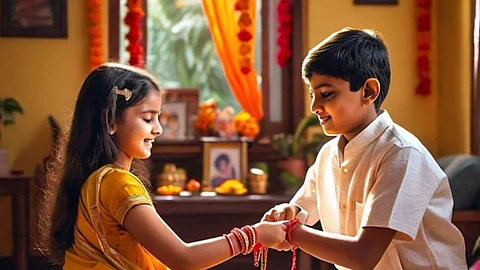
- Home
- Live Blog
- Breaking News
- Top Headlines
- Cities
- NE News
- Sentinel Media
- Sports
- Education
- Jobs

Lalit Garg
(The writer can be reached at lalitgarg11@gmail.com)
India, a land rich in cultural traditions and festivals, celebrates Raksha Bandhan not merely as a bond between a brother and a sister, but as a celebration of emotional affinity, moral consciousness, and social responsibility. This sacred festival transcends the familial realm to echo a powerful call for women’s dignity, equality, protection, and love in society. The thread of Rakhi may appear delicate, but it holds immense depth and strength. It is a symbolic bond woven with love, ideals, and responsibilities. Raksha Bandhan is not just a ritual—it is a moral summit, a ladder of noble vows. It is not only a celebration of sibling love but also a commitment from men to honour, protect, and stand by women in every sphere of life. This day reminds us that a woman is not merely an object of affection; she is a force, a reverent presence, and a guiding inspiration for society.
In today’s era, as women are reaching new heights in every domain—be it the military, science, education, or sports—Raksha Bandhan serves not only as a gesture of emotional support but as a movement for their social, political, and cultural recognition. To fully grasp the essence of this festival, it is important to reflect on its historical roots. According to the Bhavishya Purana, when the gods were losing a battle against the demons, Indrani tied a sacred thread, empowered with mantras, on Lord Indra’s wrist for his protection. This divine act helped secure his victory. During the Mughal period, Queen Karnavati of Chittor sent a Rakhi to Emperor Humayun, seeking his help to protect her kingdom. Humayun, rising above religion and power politics, honoured the Rakhi and came to her aid with full force. In the Mahabharata, when Lord Krishna’s finger bled, Draupadi tore a piece of her saree and tied it to his wound. In return, Krishna vowed to protect her forever and fulfilled that promise during her humiliation in the royal court. This wasn’t just a repayment of a debt—it was a pledge of values and righteousness. Similarly, the story of Alexander and King Porus highlights how a Rakhi tied by Alexander’s wife to Porus led him to spare Alexander’s life during war. These stories emphasise that Rakhi is not merely a token of affection but a living symbol of protection, ideals, and honor.
Today, Raksha Bandhan is not just a traditional festival—it is a cultural movement. However, it is unfortunate that the soul of the festival is slowly fading. For many sisters, it has become an occasion for dressing up and receiving gifts; for brothers, a mere formality. The sacredness of the Rakhi threads and the depth of the emotions have diminished. The festival is increasingly being swallowed by consumerism and showmanship. It is crucial that we restore its original purpose—of reverence, security, and duty towards women. Brothers must uphold their vow not just in words but through actions, by embodying these values in their everyday conduct. Sisters too must see Rakhi not just as a ritual but as a medium to assert women’s self-respect and become catalysts for social change.
In a time when crimes against women are rising—from young girls to elderly women living in fear and insecurity—Raksha Bandhan should be an opportunity to extend the vow of protection to all women, not just one’s own sister. This commitment must go beyond the thread and manifest in lifelong attitudes and behaviours. The festival conveys that a woman is not just worthy of love but of deep respect. The festival is celebrated in diverse ways across India. In North India, it is known for sibling bonding. In Maharashtra, it coincides with Narali Purnima, where fishermen offer coconuts to the sea, seeking protection. In South India, it is observed as Avani Avittam, a sacred day for Brahmins to renew their vows. In the Skanda Purana and the Bhagavat Purana, the festival is linked to the Vamana avatar, where Lord Vishnu humbled King Bali, symbolising humility over pride and service over selfishness. These narratives share a common message—surrender over ego, protection over dominance, and service over self-interest.
In the age of artificial intelligence and communication revolutions, even emotional and cultural festivals like Raksha Bandhan are losing their soul. The craze for gifts, designer rakhis, and social media display has turned this heartfelt celebration into a consumerist spectacle. Where Rakhi once symbolised an intimate emotional bond, it is now reduced to a transaction and a social obligation. This trend has robbed the festival of its depth—its essence of a sister’s love and a brother’s responsibility. It is therefore imperative that we reframe Raksha Bandhan not just as an occasion for gifting, but as a moment to recommit to women’s dignity, human relationships, and social responsibility.
Raksha Bandhan gives us a chance to redefine human relationships. It reminds us that every woman is our sister—not just by blood, but by society, culture, and humanity. Her protection is not only a social duty but a sacred human responsibility. When every man views his commitment toward women as sacred as Rakhi, and when every sister sees her brother not as a gift-giver but as a moral guardian, Raksha Bandhan will no longer remain just a festival—it will spark a revolution. Raksha Bandhan is not a stage performance. It is not for mere display—it is a festival of self-reflection. We must rescue it from the clutches of consumerism and restore its true identity—as a link between love and responsibility. This time, let the threads of Rakhi not just wrap the wrist but bind the heart—so that this festival rises beyond brother-sister affection to create a society where women feel truly protected, respected, and empowered. Only then will these sacred threads become true symbols of ideals and ladders of noble resolutions.